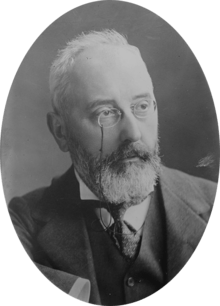Healyite Nationalist
In Irish politics of the 1890s and 1900s, the Healyite Nationalists (also known as Independent Nationalists) were Irish nationalist politicians who supported Tim Healy MP.
Healyite Nationalist | |
|---|---|
| Leader | Tim Healy |
| Founded | 1895 |
| Dissolved | 1906 |
| Split from | Irish National Federation |
| Merged into | All-for-Ireland League |
| Ideology | Irish nationalism Religious conservatism Anti-Parnellite |
| |

Healy was the most outspoken member of the Anti-Parnellite majority in the Irish Parliamentary Party. In the following decades he became estranged from the movement, setting up his own personal organisation as Member of parliament (MP) for North Louth in 1892, together with five fellow MPs, under the name "People's Rights Association". It was dubbed the 'clerical' party due to Healy's closeness to his clerical ally Cardinal Michael Logue.[1]
The parliamentary election results for Ireland in the 1895 general election show eight Healyite Nationalist MPs returned to the House of Commons of the United Kingdom. These, apart from Tim Healy, included James Gibney, Maurice Healy, Arthur O'Connor and Timothy Daniel Sullivan.
In the following 1900 general election, Healyites stood in sixteen constituencies, of which seven were elected, John Campbell (Armagh South), John Hammond (Carlow), Peter Ffrench (Wexford South), James Laurence Carew (Meath South), Joseph Nolan (Louth South), Tim Healy (Louth North) and Patrick Kennedy (Westmeath North).[2] One of those who failed to be elected was William Martin Murphy, a close associate of Healy.
Finally, in the general election of 1906, this number fell to one, Tim Healy himself, who later associated himself with the All-for-Ireland League.
Notes
- David W. Miller Church, State and Nation in Ireland 1898-1921 Gill & Macmillan (1973), pps. 17, 50-53, 124, 143-4 ISBN 0-7171-0645-4
- Miller, David: p.51
References
- Callanan, Frank: T. M. Healy, pp. 422–441, Cork University Press (1996), ISBN 1-85918-172-4
- Walker, Brian M. (ed.): Parliamentary Election Results in Ireland, 1801-1922, pp. 151–162, Royal Irish Academy Press, Dublin (1978) ISBN 0-901714-12-7